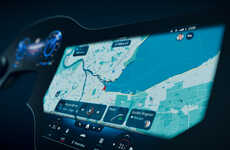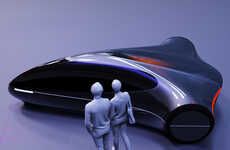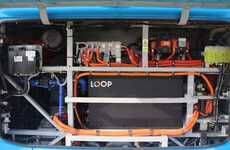
This Hybrid EMS Creates Energy-Efficient Cars That Learn
Laura McQuarrie — February 23, 2016 — Autos
References: eurekalert.org & spectrum.ieee.org
An engineering team from University of California, Riverside envisions that energy-efficient cars of the future will not be defined by a trait, but from an ability to learn more sustainable habits.
The proposed hybrid energy management system is designed to advance the existing energy management systems that are key components of plug-in hybrid electric vehicles. This system is what manages the usage of fuel and electricity and proposes that each power source could be used in only the most efficient way. This system is set to make use of machine learning software to assess road and traffic conditions. When the new hybrid energy management system was tested on a 32-kilometer commute in Southern California, the intuitive system was able to provide a savings of 12%.
Beyond simply noting the historical behaviors of individual drivers, the engineers envision that the next step would be to build an entire cloud-based network where cars could learn from one another.
The proposed hybrid energy management system is designed to advance the existing energy management systems that are key components of plug-in hybrid electric vehicles. This system is what manages the usage of fuel and electricity and proposes that each power source could be used in only the most efficient way. This system is set to make use of machine learning software to assess road and traffic conditions. When the new hybrid energy management system was tested on a 32-kilometer commute in Southern California, the intuitive system was able to provide a savings of 12%.
Beyond simply noting the historical behaviors of individual drivers, the engineers envision that the next step would be to build an entire cloud-based network where cars could learn from one another.
Trend Themes
1. Hybrid Energy Management Systems - Developing hybrid EMS creates opportunities to advance existing energy management systems through the use of machine learning software
2. Machine Learning Software for Cars - Machine learning software for cars offers opportunities for energy-efficient, environmentally friendly vehicles that are capable of autonomous learning
3. Cloud-based Networks for Autonomous Cars - The next step is constructing a cloud-based network where autonomous cars could learn from one another
Industry Implications
1. Automotive Industry - The automotive industry has opportunities to develop energy-efficient vehicles with hybrid energy management systems and machine learning software
2. Machine Learning Industry - Machine learning industry has opportunities to develop software catered for automotive companies to advance and develop more energy-efficient vehicles
3. Cloud Computing Industry - The cloud computing industry can offer development for cloud-based networks for autonomous cars to share data to improve autonomous driving capabilities
1.1
Score
Popularity
Activity
Freshness























